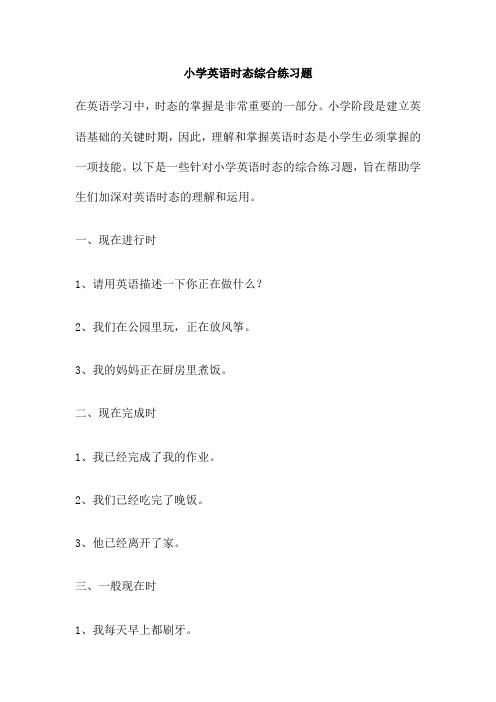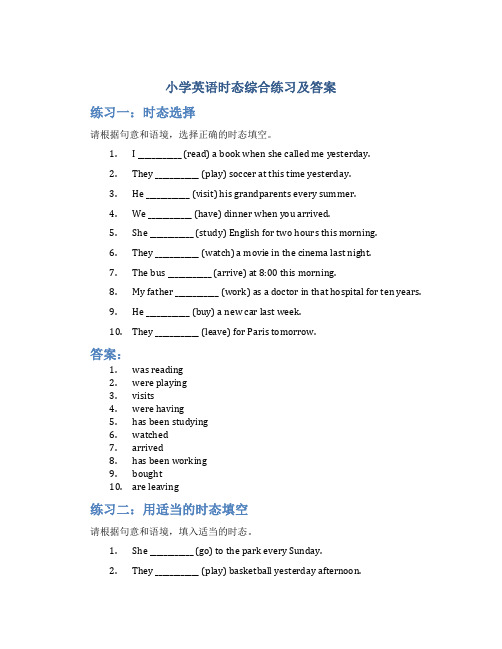时态综合
- 格式:ppt
- 大小:771.50 KB
- 文档页数:51

小学英语时态综合练习题在英语学习中,时态的掌握是非常重要的一部分。
小学阶段是建立英语基础的关键时期,因此,理解和掌握英语时态是小学生必须掌握的一项技能。
以下是一些针对小学英语时态的综合练习题,旨在帮助学生们加深对英语时态的理解和运用。
一、现在进行时1、请用英语描述一下你正在做什么?2、我们在公园里玩,正在放风筝。
3、我的妈妈正在厨房里煮饭。
二、现在完成时1、我已经完成了我的作业。
2、我们已经吃完了晚饭。
3、他已经离开了家。
三、一般现在时1、我每天早上都刷牙。
2、我们每周都去公园玩。
3、他每天晚上都读书。
四、一般过去时1、昨天我去了电影院。
2、上周我们去了海滩。
3、昨晚她看了电视。
五、一般将来时1、我明天将要完成作业。
2、我们下周将要去看电影。
3、他将在下个月搬到新家。
以上练习题旨在帮助学生理解和掌握基本的英语时态。
对于小学生来说,时态的学习可能相对复杂,但通过反复练习和实际应用,他们可以逐渐掌握并开始在日常生活中运用这些时态。
教师和家长可以鼓励学生多做类似的练习,帮助他们提高英语时态的理解和运用能力。
小学英语时态练习题一、一般现在时1、I eat apples every day. (我每天吃苹果。
)2、He studies hard every day. (他每天努力学习。
)3、They play basketball every week. (他们每周打篮球。
)二、现在进行时1、I am eating apples now. (我现在正在吃苹果。
)2、He is studying hard now. (他现在正在努力学习。
)3、They are playing basketball now. (他们现在正在打篮球。
)三、一般过去时1、I ate apples yesterday. (我昨天吃了苹果。
)2、He studied hard yesterday. (他昨天努力学习了。
)3、They played basketball yesterday. (他们昨天打篮球了。

小学英语时态综合练习及答案练习一:时态选择请根据句意和语境,选择正确的时态填空。
1.I ____________ (read) a book when she called me yesterday.2.They ____________ (play) soccer at this time yesterday.3.He ____________ (visit) his grandparents every summer.4.We ____________ (have) dinner when you arrived.5.She ____________ (study) English for two hours this morning.6.They ____________ (watch) a movie in the cinema last night.7.The bus ____________ (arrive) at 8:00 this morning.8.My father ____________ (work) as a doctor in that hospital for ten years.9.He ____________ (buy) a new car last week.10.They ____________ (leave) for Paris tomorrow.答案:1.was reading2.were playing3.visits4.were having5.has been studying6.watched7.arrived8.has been working9.bought10.are leaving练习二:用适当的时态填空请根据句意和语境,填入适当的时态。
1.She ____________ (go) to the park every Sunday.2.They ____________ (play) basketball yesterday afternoon.3.I ____________ (have) a cup of coffee this morning.4.He ____________ (visit) his grandparents last summer.5.We ____________ (watch) a movie in the cinema last night.6.The train ____________ (arrive) at 8:00 this morning.7.My father ____________ (work) as a teacher in that school for five years.8.They ____________ (buy) a new car last week.9.She ____________ (study) English for two hours yesterday.10.I ____________ (leave) for Paris tomorrow.答案:1.goes2.played3.had4.visited5.watched6.arrived7.has been working8.bought9.studied10.am leaving练习三:综合时态练习请根据句意和语境,填入适当的时态。


时态综合练习题1. 过去式过去式是用来表示已经发生过的动作、事情或状态的时态。
在英语中,过去式通常由动词的过去式形式(例如,加了-ed后缀的动词)表示。
例如:- I studied for the exam last night.(昨晚我学习了考试的内容。
)- She cooked dinner for her family yesterday.(她昨天为家人做了晚饭。
)- They went to the beach during their vacation.(他们在假期期间去了海滩。
)2. 现在完成时现在完成时用来表示过去发生的动作或事情与现在的关系。
通常由助动词“have / has”和动词的过去分词形式构成。
例如:- I have seen that movie before.(我以前看过那部电影。
)- She has already finished her homework.(她已经完成了她的作业。
)- They have lived in this city for five years.(他们在这个城市居住了五年了。
)3. 过去完成时过去完成时用来表示在过去某个时间或动作之前已经发生或完成的动作或事情。
通常由助动词“had”和动词的过去分词形式构成。
例如:- I had already eaten when she arrived.(她到达时我已经吃过饭了。
)- They had finished the project before the deadline.(他们在截止日期之前完成了这个项目。
)- She had studied German for two years before moving to Germany.(在搬到德国之前,她已经学了两年德语。
)4. 现在进行时现在进行时用来表示现在正在进行或发生的动作或事情。
通常由助动词“am / is / are”和动词的现在分词形式构成。

大学四种时态综合复习现在时态- 现在时态用来描述目前正在发生的动作或状态。
- 表达方法:主语 + 动词的原形(第三人称单数要加-s)+ 其他。
- 例句:- 我现在研究中文。
(I am studying Chinese now.)- 他们每天上学。
(They go to school every day.)过去时态- 过去时态用来描述已经发生的动作或状态。
- 表达方法:主语 + 动词的过去式 + 其他。
- 例句:- 我昨天去了电影院。
(I went to the cinema yesterday.)- 她小时候住在乡村。
(She lived in the countryside when she was young.)将来时态- 将来时态用来描述将要发生的动作或状态。
- 表达方法:主语 + will + 动词的原形 + 其他。
- 例句:- 我明天会给你打电话。
(I will call you tomorrow.)- 他们下个月要去旅行。
(They will go on a trip next month.)完成时态- 完成时态用来描述过去某个时间点之前已经完成的动作或状态。
- 表达方法:主语 + have/has + 动词的过去分词 + 其他。
- 例句:- 我已经完成作业了。
(I have finished my homework.)- 他们已经看过这部电影了。
(They have watched this movie.) 以上是大学四种时态的综合复习内容,希望能对你有帮助!。

时态综合练习(一般现在时,现在进行时,一般将来时,一般过去时)1.Look!LiLei(do)homeworkinhisbedroom.2.Ann'sgrandparentsenjoy(read)inthevillage.3.Pleasestandupand(read)thebook.4.Jim'sgrandfatherlikes(walk)aftersupper.5.Where(be)Jim?He(be)inhisfactory.He(work)there.6.Doyoulike(have)eggsforbreakfast?7.Listen!Mary(sing)inherroom.8.yourfriend(sit)underthebigtreenow?9.Let's(go)and(help)theoldman.10.Canhe(fly)akite?Yes,hecan.He(fly)akitewithhisfriendthere.11.I(write)abookatthemoment.I(finish)itnextmonth.12.Myfamilyoften(go)forapicniconSunday,butnextSunday,we(stay)athome.13.It(be)teno'clocknow.I(go)tobedintenminutes'time14.Mybrotherusually(get)uplate.Buttomorrowhe(get)upearly,becausehisfriends(come)toseehim.15.you(be)athometomorrowafternoon.No,I.I(go)totownwithmyfriends.16.She(come)backat7thisevening.17.Whenyou(buy)thisradio?I(buy)ittheyearbeforelast.18Atthemoment,he(be)inthelibrary,He(read)amagazinethere.19They(notbe)atschoolthedaybeforeyesterday.20Whathe(say)toyouyesterday?21youalways(get)upsolate?No,I(get)upatfiveyesterday.22Whatwe(do)tonight?we(go)tothecinema?23WhereisTom?He(look)forhistieupstairs.24Whatyou(do)onSunday?25(notsay)thattoyourfather,orhe(be)angry. 26They'regoing(move)toLondonnextyear.27Whendidhe(telephone)meyesterday?28Isyourbrother(write)aletter?29Don't(close)thewindow.30Hecan(go)withme.31Iwill(leave)heretomorrow.32Shedoesn't(like)Englishatall.33Whatwillhe(do)tomorrowmorning?34Marymust(write)theletterinEnglish.35Whereyou(buy)theTVset?InShanghai.36Italways(rain)inLondon.Look,it(rain)again.37Whenhe(get)upeverymorning?Buthe(get)upat8thismorning.38Whatthey(talk)aboutintheclassroom? Whyisitsonoisy?Well,I(notknow).39I(get)aletterfromTomlastmonth.40He(tell)usaninterestingstorylastnight. 41She(have)acoldlastweek.42I(lose)myway,soIaskedapolicemanforhelp.时态专项复习(一般现在时、现在进行时、一般过去时)一、用动词的正确形式填空I.I(do)myhomeworkeveryevening.2.We(fly)kites intheparkonSundays.3.Mymother(clean)ourroomonSundays.4.Tom(play)thepianoeverySaturday.Nowhe(play).5.She(like)swimming.She(swim)lastweekend.uallymymother(wash)thedishesafterlunch.Butmygrandma(wash)today.7.Lookattheman!He(read)amagazine.8.Look!Theplane(fly)overthebuilding.9.Listen!Myaunt(sing)intheroom.Sheisasinger.She(like)singing.She(have)amusicshow.Sheisexcited.10.TomandMikealways(swim)intheriver.They(swim)intheswimmingpoolthreedaysago.Look!They(swim).II.Whatyouusually(do)intheevening?I(play)computergames.12.What you (do)now?I (make)apaper plane.13.What he (do)now?He (dance).14.What she (do)yesterday?She (visit)he rgrandparents.15. yourmother (read)newspaperin themorning?Yes, She16. ______ you(like)fishing?No,I.Ilike(swim),butmybrother(like).17.Howyourfather(go)toworkeveryday?He(go)bybike.Butit'scoldtoday.He(take)theNo.21bus,,andhe(go)toworkbytaxiyesterday.18.themonkey(like)climbingtrees?Yes,it.19.Whatyourfather(do)afterlunch?He(read)acomicbook.Whathe(do)today?He(clean)thekitchenformygrandma.Look!He(clean).20.you(collect)stamps?Yes.I.yourbrother(collect),too?No,he.二、选择题1.hetotheparkat6:30inthemorning?No,he.A.Does;goes;doesB.Does;go;doesn'tC.Does;go;does2.Whatcolouryouthisbookcase?Iitpink.A.are;goingtopaint;amgoingtopaintB.do;paint;paintC.did;paint;painted3.Timalways apictureathome. He acarnow. A.draws; isdrawingB.draw; drawC.draws;draw4.Sheusually herfriends.Theyoften tea.A. see;drinkB.sees;drinksC. sees;drink5.Heusually thedishesatnight. buttonighthe clothes.A.wash;washB.washes;isgoingtowashC.iswashing;washes6.Mr.Greenusuallyhisnewspaperintheevening,butheand hiswifetelevisionyesterdayevening.A.reads;watchesB.reads;isgoingtowatchC.reads;watched17.Wherearethemanandthewoman?Theynearthetree.A.sitB.satC.aresitting8._____ yourpenpaldiving?No,he.Hewritingstories.A.Does;like;doesn't;likesB.Does;likes;doesn't;likeC.Do; like;don't;likes9.youfishingyesterday?No,we.A.Does;go;doesn'tB.Did;go;didn'tC.Do;go;don't10.Openthewindow,Please.Look!Heit.A.opensB.isopenningC.isopening11.Iusuallysomemilkeveryday.ButIcoffeeyesterday.A.drink;drankB.isdrinking;drinkC.drank;amdrinking12.Mr.Greenoften__hisnewspapersatnight.Buthean interestingbooktonight.A.reads;readsB.reads;readC.reads;isgoing toread13.Theoldmanplayingsportsinthepark.Hemorningexercisenow.A.likes;isdoingB.likes;doesC.like;doing14.Whatyouusuallyintheevening?Icomputergames.Whatyoulastnight?Iabook.A.do;do;play;did;do;readB.did;do;played;do;do;readC.does;do;plays;do;do;amreading15.Wheretheboy?Heacrosstherivernow.A.does;swim;swimsB.is;swimming;isswimmingD.is;swimming; isswimming16.____ youtomusicnow?Yes,we.A.Do;listen;doB.Did;listen;didC.Are;listening;are17.Putonyoucoat,please.OK.Iiton.A.amputtingB.amgoing toputC.put18.youcoffee?Yes,I.A.Do;like;doB.Did;like;didC.Are;like;am19.Look!Twocatsacrossthewall.A.runB.runsC.arerunning20.Shetea,buthe.A.likes;doesn'tB;like;don'tC.like;doesn't21. ----- Howmanyinthetree?Therearetwo.A.birdaretherB.birdsistherC.birdsarethereD.birdsaretheir22..MrJohnsonusuallygoestothehospital.A.byhiscarB.bytheblackcarC.bycarD.bythenewcar23.Doesyourbrotherplayping-pong?A.oneveryafternoonB.everyafternoonC.ineveryafternoonD.at everyafternoon24.doyouusuallycometoschool?A.HowB.WhatC.WhichD.Howmuch25.---- Don'tyouusuallycometoschoolbybike?.But Isometimeswalk.A.Yes,IdoB.No,Idon'tC.Yes,IdoD.No,Idon't26.WhatTomandhismotherlike?A.doesB.doC.isD.are27.What'syourhobby?Myhobbyismodelplane.A.makingB.makeC.makingD.made28.DidyougototheparkonSundaymorning?,Iwentthere intheafternoon.A.YesB.NoC.SureD.Sorry29.Idon'tthinkhe'ssogreat,butmymom.A.doB.doesC.isD.are30.Akidbreakfasteverymorning,becauseit'sgoodforhis health.A.havetoB.hastoC.hastohaveD.hastohas。
专业课原理概述部分一、选择题(每题1分,共5分)1.下列哪个时态表示过去某个特定时间发生的动作?A. Simple PresentB. Simple PastC. Simple FutureD. Present Continuous2.现在进行时态的构成是?A. 动词原形 + ingB. 动词过去式 + ingC. 动词原形D. will + 动词原形3.下列哪个句子使用了正确的过去进行时态?A. She was watched TV all evening.B. He was played football yesterday.C. They was eating dinner when I called.D. I was reading a book at 8 PM yesterday.4.将来完成时态的构成是?A. will have + 过去分词B. will + 动词原形C. would have + 过去分词D. is going to + 动词原形5.下列哪个时态表示将来某个时间开始,并可能继续下去的动作?A. Simple FutureB. Future ContinuousC. Future PerfectD. Present Continuous二、判断题(每题1分,共5分)1.现在进行时态不能用于描述正在进行的动作。
()2.过去进行时态的构成是was/were + 动词原形。
()3.将来完成时态可以用来表示在将来某个时间之前已经完成的动作。
()4.现在完成时态的构成是have/has + 过去分词。
()5.过去完成时态的构成是had + 过去分词。
()三、填空题(每题1分,共5分)1.我昨天晚上_____(read)了一本好书。
2.他们_____(go)去公园散步了。
3.当她到达学校时,雨_____(stop)了。
4.到明年这个时候,我_____(graduate)已经三年了。
综合时态一般现在时一般过去时现在进行时 概念时间标志词结构经常性、习惯性的动作频率副词:always/ usually/often/sometimese very day/week/month/yearb e 动词实义动词a m \is \are否定句:be 后加not一般疑问句:be 动词提前动词原形(非第三人称单数)三单(第三人称单数)一般疑问句:Do they like pandas?一般疑问句:Does she like pandas?概念时间标志词结构已经发生过的动作或事情y esterday \ last week 、last month 、last year实义动词概念正在发生的事或动作时间标志词n ow\ look \listen结构b e+动词ing一般将来时概念还没有发生的事情或动作时间标志词t omorrow \ next day 、next week 、next year……结构w ill +动词原形b e going to +动词原形 w as \ were一般疑问句:Was she ten years old last year?肯定句: She was ten years old last year.否定句: She was not ten years old last year.b e 后加notb e 动词提前句式肯定句:She went shopping yesterday.否定句:She didn't go shopping yesterday.动词前加didn't,一般疑问句:Did she go shopping yesterday?句前加Did注意:didn't 和did 后动词要还原成原形动词变化规则一般情况直接加ed以不发音的e 结尾加d like——liked以辅音字母加y 结尾,变y 为i 加ed study——studied以辅元辅结尾的重读闭音节结尾,双写尾字母加ed stop——stopped肯定句:They like pandas.否定句:They don't like pandas.借助don't句前加Do肯定句:She likes pandas.否定句:She doesn't like pandas.动词前加doesn't句前加Does动词ing 变化规则句式肯定句: She is reading否定句:She is not readingb e 后加notb e 后加not一般疑问句:Is she reading?b e 动词提前直接加ing不发音的e 结尾,去e 加ing以重读闭音节结尾的单词,双写尾字母加ing shop——shopping以ie 结尾,变ie 为y 加ing lie——lying肯定句: He will visit his grandmother.否定句: He will not visit his grandmother.一般疑问句: Will he visit his grandmother ?肯定句: He is going to visit his grandmother.否定句: He isn't going to visit his grandmoter.一般疑问句:Is he going to visit his grandmother? 否定句:will 或be 后加not一般疑问句 will 或be 动词提前。